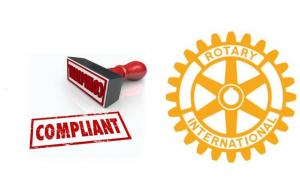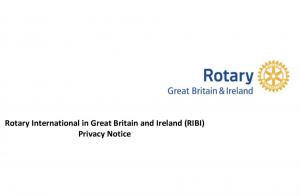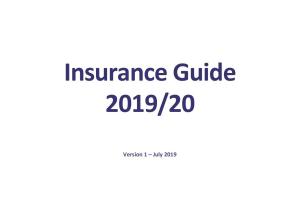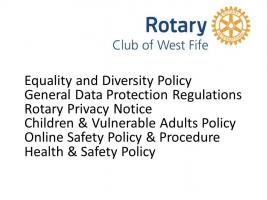Disability Guidance
Disability is an Equality and Diversity issue. As Rotarians we need to give this full and proper consideration in order not only that we comply with the law, but also our obligations as Rotarians

RIBI-Disability-Guidance-2016-17-v2.pdf
Physical access
There are many people with impaired mobility and only a tiny proportion of these are wheelchair users. Some were born with a disability, some have acquired a disability, and many are impaired by the effects of ageing. One of the biggest problems they face in daily life are the barriers we construct or fail to remove. The most common barriers are –
• Lack of suitable parking within the distance that person can manage.
• Lack of a step free route externally or internally. This is vital for a wheelchair user or
someone who cannot manage steps. It is generally unsafe to lift or carry someone, other
than in an emergency, and a risk assessment is essential before doing so.
• Steps or stairs without handrails in a suitable place. Those who can cope with steps and
stairs often need a solid handrail to assist them.
• Poor surfaces such as loose gravel or uneven grass. Manual wheelchair users and some
ambulant disabled people find loose gravel difficult or impossible to negotiate.
• Lack of accessible toilet facilities. Wheelchair users need space. Many disabled people need
grab rails. Visually impaired people like good lighting levels and good colour contrasts (e.g.
dark coloured toilet seats to offset against the sea of white).
• Space within rooms. It can be difficult to manoeuvre a wheelchair, scooter, or other
mobility aid in tightly packed rooms. If someone is accompanied by an assistance dog space
is need for the dog.
• Difficult to see steps and trip hazards are a real problem for people with poor eyesight.
Good colour contrasts are vital. Grey on grey just does not work.
Communication
The most common impairment in the population is hearing loss. The provision of good amplification
systems in all but the smallest rooms can make a massive difference. These should be accompanied
by a hearing induction loop (or equivalent) so that hearing aid users can obtain a direct feed to their
aids.
Good microphones (preferably cordless and including lapel and headset models) and ensuring speakers know how to use them is vital. Never ever allow the speaker to get away with “I don’t need the mike, I have a loud voice”. In a debate or question session ensure all speakers use microphones.
Visual impairment can range from some loss of peripheral vision to total blindness. Be prepared to provide what assistance the person needs. Ask them what is required. Remember that they may be unable to see your wonderful PowerPoint slides and you will need to adjust your presentation accordingly. Check how they want communications presented. They may be happy with emails provided there is no reliance on images. They may want printed matter in large print.
Attitude
Never take the view that a disabled person would not be able or want to do something. Ask them
for their opinion.
Approach meeting the needs of disabled people in a positive way.
Remember that assistance dogs are allowed almost everywhere and the normal bans on dogs do not
apply.
There are a few exceptions such as some zoos and animal parks, where alterative provision is made. Always ask the disabled person before approaching the dog. Food is rarely required, but water is usually welcome. During longer events the offer of assistance to walk the dog or take it outside for calls of nature may be appreciated.
Existing members
Are you meeting the needs of existing members properly? Have any members developed disabilities
that you have overlooked? Are one or two members struggling to hear the speakers? Is a member
suffering from memory loss? Can someone no longer read the notices passed round at the meeting?
If so you may find them unwilling to tell you. They may just start attending less often or become less
involved or even resign. Try to identify the needs before they become an issue and meet them head
on. There are lots of ways we can help –
• Offer a lift to meetings.
• Change their role to one that can be done despite memory loss.
• Sort out the audio equipment and induction loop.
• Change the meeting venue to one with good access.
Potential members
If someone has a disability they may not even consider joining Rotary. Make clear the welcome and
access you have on your website and publicity. Take positive steps to encourage disabled people to
come along as potential members. After all, would you really want to discourage Dr Stephen
Hawking, Baroness (Tanni) Grey-Thompson, Sir Bert Massie, Simon Weston, Frank Gardner, Peter
White, or Evelyn Glennie from joining your Club, yet all of them have substantial disabilities.
Others that may come in to contact with us
This group includes visitors to a Club, such as speakers and visiting Rotarians. It does, however, also
include all the people we come in to contact with through the Rotary year. There are people who
attend our events as guests or as ticket holders or as spectators. People that we shake tins at.
People we organise outings for or help in other ways. Potential Rotary Scholars and Group Study
Exchange participants.
 Contact Stuart Nicol about this page:
Contact Stuart Nicol about this page:
Related pages...

Club's Compliance Statement
more Compliance Statement signed by the Secretary on behalf of the club, confirming that Club Council has read and adopted the RIBI documents

Online Safety Policy & Procedure
more Communicating online with children and vulnerable people

Health and Safety Policy
more Ensuring that all reasonable steps are taken to safeguard the participants, members of the public, volunteers, Rotarians and anyone who may be in the vicinity of a Rotary event or activity

Equality and Diversity Policy
more Rotary International in Great Britain and Ireland (RIBI) is committed to promoting equality, fairness and respect.

General Data Protection Regulations
more On 25th May 2018 data protection regulations are changing. These changes give you more rights, including the ability to amend or withdraw from how we use your data and to ask to see, update or remove it.

Rotary Privacy Notice
more Rotary International in Great Britain and Ireland (“we”) promise to respect the confidentiality of any personal data you share with us

Safeguarding Policy - Children
more The Clubs believe that children have the right to be secure from abuse, and RIBI are committed to protecting all the children in their care from harm.

Safeguarding Policy - Vulnerable Adults
more The Club believes that vulnerable adults must be safeguarded from all forms of abuse. It recognises that it must at all times protect vulnerable adults from the risk of abuse and identify and deal with specific instances of abuse if they occur.

Dignity Policy
more This document has been produced to clarify those lines in some detail, in order that we may protect our Rotary values and our standing in the wider community.

Rotary Insurance Guide
more 2019-2020
back to page above this...

Compliance
back All the club’s policies covering Equality & Diversity and GDPR